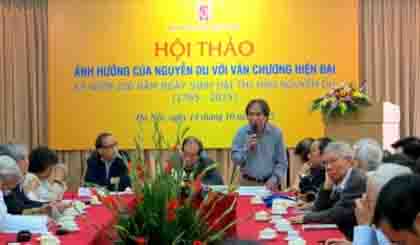Workshop honours Nguyen Du's legacy
Crowds of experts, writers, poets and readers gathered at a workshop on October 13 in Hanoi to honour the legacy of the great poet Nguyen Du.
 |
| Crowds of experts, writers, poets and readers gathered at a workshop on October 13 in Hanoi to honour the legacy of the great poet Nguyen Du. |
Crowds of experts, writers, poets and readers gathered at a workshop on October 13 in Hanoi to honour the legacy of the great poet Nguyen Du.
The event, organised by the Vietnam Writers’ Association, also aims to mark the upcoming 250th birthday anniversary of the poet (January 3).
Participants highlighted his most beloved work ‘Truyen Kieu’ (the Tale of Kieu), saying that it has inspired every Vietnamese poet, writer and person over the past century.
The Tale of Kieu is an epic poem written by Nguyen Du that recounts the life, trials and tribulations of Thuy Kieu, a beautiful and talented young woman, who had to sacrifice her love and life to save her family.
Former President of the Association Phong Le hailed Nguyen Du’s huge achievements in his writing career, saying that he is the first Vietnamese to be honoured as a world cultural figure.
Meanwhile, President of the Association Huu Thinh hailed the human value of the poems by Nguyen Du, saying that they have greatly influenced current literature.
Nguyen Du (1766-1820), also known as To Nhu and Thanh Hien, was recognised by UNESCO as a World Cultural Celebrity among 108 others in 2003.
His most influential work, The Tale of Kieu, is a 3,254-line classic verse novel written in ‘luc bat’, the form that consists of alternating lines of six and eight syllables, a traditional verse form of Vietnam's poetry.
Kieu's story is vastly popular in Vietnam; many people know the epic by heart and it has been translated into 20 different languages including French, Chinese, English, Russian and Japanese.
(Source: nhandan.org.vn)
.
 về đầu trang
về đầu trang







